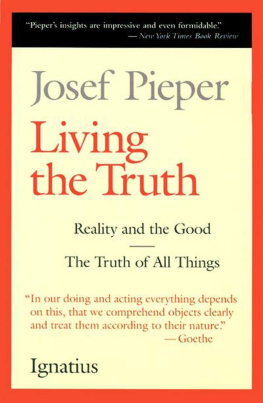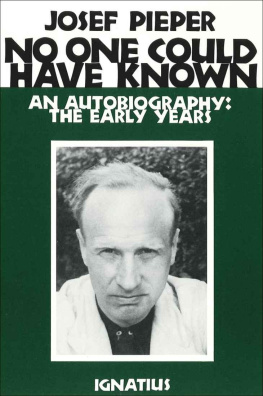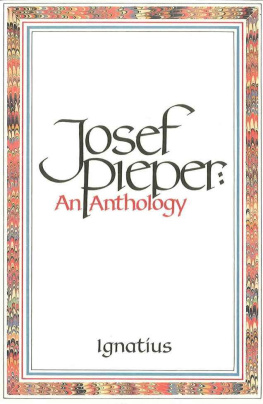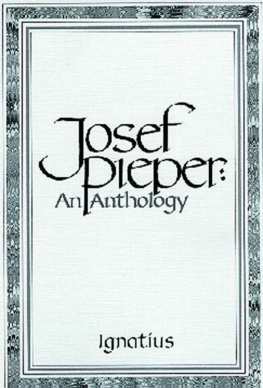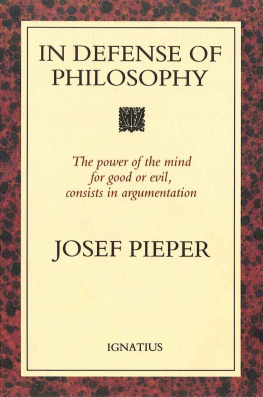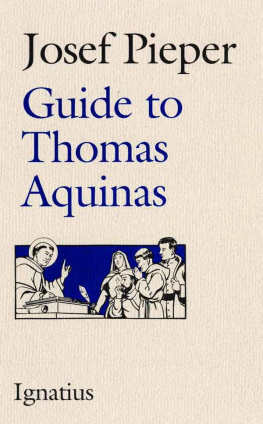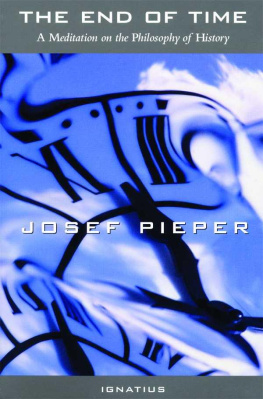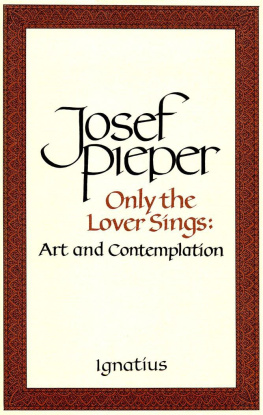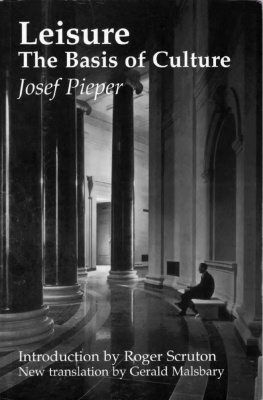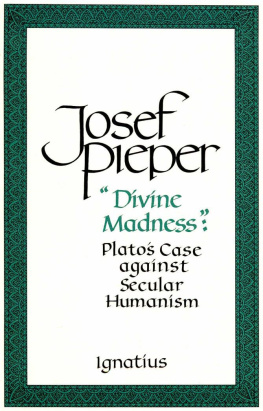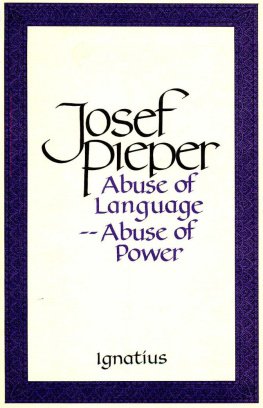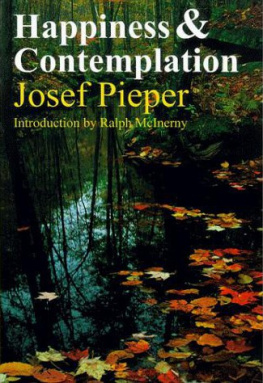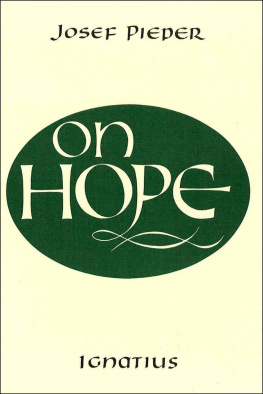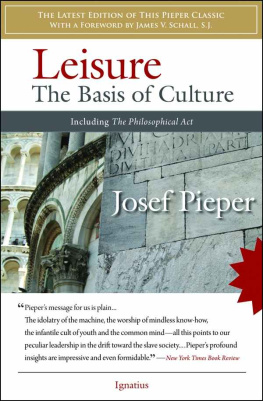LIVING THE TRUTH
JOSEF PIEPER
Living the Truth
The Truth of All Things
and
Reality and the Good
IGNATIUS PRESS SAN FRANCISCO
Titles of the German originals:
Wahrheit der Dinge
1966 by Kel Verlag, GmbH & Co.
Munich
Die Wirklichkeit and das Gute
1963 by Ksel Verlag GmbH & Co.
Munich
Cover design by Roxanne Mei Lum
1989 Ignatius Press, San Francisco
All rights reserved
ISBN 978-0-89870-261-3
ISBN 0-89870-261-5
Library of Congress Control Number 89-84891
Printed in the United States of America
CONTENTS
1 The principle of the truth of all things
2 From Plato to Francis Bacon
3 Hobbes, Descartes, Spinoza, Leibniz, and Kant on the truth of all things
4 The concept of the truth of all things as Kant knew it
5 The trivialization of the original concept by Wolff and Baumgarten
6 The distinctiveness of Wolffs conception
7 Wolff and Scholasticism
1 Thomas Aquinas: all that is, is true
2 The transcendentals in traditional ontology
3 Truth as orientation toward a mind
4 The nature of knowledge
5 Receptive and creative knowledge
6 Creative knowledge: the most complete relation between a mind and reality
7 Truth as relatedness toward a creative mind
8 The truth of all things as relatedness toward the artistry of God
9 The theological foundation of the ontological doctrine of the truth of all things
10 The deistic concept of the Enlightenment regarding a God outside this world
1 All reality is positioned between the mind of God and the mind of men
2 The truth of all things as their knowability for man
3 All things are veiled and unfathomable
4 Knowledge as the offspring of truth
1 The concept of the truth of all things in the tradition: Augustine, Avicenna, Averros, Anselm of Canterbury, Alexander of Hales, Albertus Magnus
2 Duns Scotus, Francisco Suarez, Gabriel Vasquez, German academic metaphysics of the seventeenth century
1 The truth of all things, and the minds universal relatedness
2 Intrinsic existence and universal grasp
3 The soul, in a certain sense, is all in all
4 Mans universal openness (Gehlen)
5 The universal character of essential forms and of the world of man
1 The unquenchable yearning of man
2 The interaction of environment and world in mans existence
3 Man immersed in the universality of the world
The Thesis
A Realistic Theory of Cognition and Intellectualistic
Ethics
I Reality as the Measure of Cognition
II The Identity of Mind and Reality
III Knowledge and Truth
IV Objectivity as an Attitude in Knowing
V The Unity of Theoretical and Practical Reason
VI The Structure of Moral Action
VII The Voice of the Primordial Conscience
VIII Prudence
IX Digressions
X Objectivity as an Ethical Attitude
XI Summary
Conclusion
The Structure of Moral Acts
Appendix
Sources
The Truth of All Things
An Inquiry into the Anthropology
of the High Middle Ages
Translated
by
Lothar Krauth
INTRODUCTION
With the expression, All that exists is true, Western philosophy for almost two millenia intended to make a statement not only about reality as such but no less about the nature of man. The great teachers of the High Middle Ages had uncritically absorbed the quintessence of Western traditional thought since earliest Greek times and thus represented it undistorted. These teachers above all took the seemingly unrealistic principle of the truth of all reality in fact as an anthropological statement that explained something about human nature. To show this is the first purpose of our study.
We do not set out, therefore, to defend the statement about the truth of all things with objective arguments, much less to prove it (a quite impossible task, after all). No, the intention is entirely to concentrate on interpretation alone. We wish to show the meaning of this statement within the ontology of the High Middle Ages. Consequently, we shall have to deal primarily with Thomas Aquinas, the outstanding representative of classical medieval metaphysics. It seems that in his thought there converged, for a brief historical moment, those lines that previously had searched, separately, for a focal point, and that soon afterward again diverged in different directions.
And yet, the ultimate purpose of our study does not concern history. Rather, through an exposition as meticulous and comprehensive as possible, we aim to draw out the far-reaching ontological dynamics inherent in this principle of the truth of all things.
Yet the truth that dwells in the core of all things none but the few do contemplate.
Anselm of Canterbury ( De veritate , chap. 9)
Chapter One
Omne ens est verum , all that is real, is true. Confronted with the concise sweep of this statement, we of these latter days are prone to feel intuitively an admiration for such grand simplicity, yet coupled with confusion, even with utter puzzlement as to the exact and specific meaning of those few words.
The other statement, omne ens est bonum , all that is, is good, equally a principle of classical Western metaphysics, does not appear, if only on the surface, to be so totally inaccessible to our understanding. We of the post-Kantian era may at least think we understand it somehow, perhaps by identifying it with a certain thesis of liberalism (the mother of the notion that man is essentially good). But, of course, such an interpretation misses entirely the precise and original meaning of that principle. And the deceptive certainty of such an erroneous approach may well be more detrimental than the utter perplexity caused by the statement, all that is real, is true.
Such, then, is indeed the situation: drawing only on prevailing and common thinking, the attempt to unlock the meaning of this statement will not succeed, not even in opening up a dead end.
Post-Kantian philosophy, here understood in a nonchronological sense, is of no help in this matter. All the textbooks, even those that lately claim again the occasional title of ontology, omit any reference to the principle of the truth of all things.
In one of the Platonic Dialogues we find the statement, what is most noble ( ariston ) in all existing things, is truth. the doctrine of those notions that transcend and encompass the different types and categories of all existing beings: the concepts of unity, truth and goodness.
The Renaissance humanists, then, are among the first to reject the principle of the truth of all things; they even deny that it expresses anything meaningful at all.
The stagnating and sterile conceptual framework of late Scholasticism no doubt needed to be shaken up drastically. But for almost a century the protest against every traditional notion knew no bounds; in Goethes words, not least and especially in all branches of science. So much so that Francis Bacon finally had the audacity to wipe out everything written so far on the slate of humanity. Goethe notes insensitivity of Bacon toward the values of antiquity and calls it very unpleasant. For who can listen impassively when Bacon compares the works of Aristotle and Plato to lightweight planks that are easily washed up oh our shores by the streams of time, precisely because they lack robust and meaningful substance.
We shall briefly consult some other thinkers who, like Bacon, should be counted among the ancestors and founding fathers of modern philosophy and science.
Bacons compatriot Hobbes is quite familiar with the principle of ontological truth. But for him this concept of the metaphysicians is inane and childish.
Descartes explicitly decides to get away from all philosophical tradition, and this should not be overlooked
Next page
